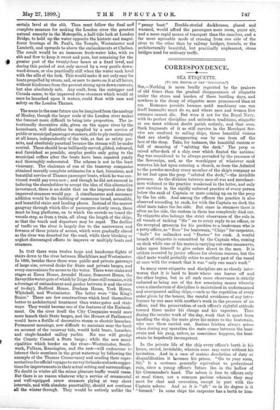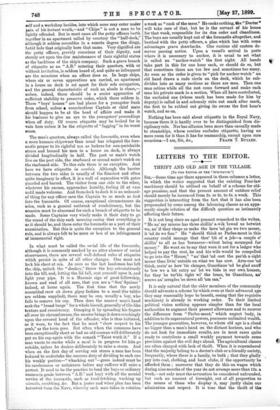CORRESPONDENCE.
SEA ETIQUETTE.
[TO THE EDITOR OF THE "SPECTATOR."]
Sia,—Nothing is more loudly regretted by the praisers of old times than the gradual disappearance of etiquette under the stress and burden of these bustling days, and nowhere is the decay of etiquette more pronounced than at sea. Romance persists because until machinery can run itself humanity must do so, and where men and women live romance cannot die. But were it not for the Royal Navy, with its perfect discipline and unbroken traditions, etiquette at sea must without doubt perish entirely, and that soon. Such fragments of it as still survive in the Merchant Ser- vice are confined to sailing ships, those beautiful visions that are slowly disappearing one by one from off the face of the deep. Take, for instance, the beautiful custom se full of meaning of "saluting the deck." The poop or raised after-deck of a ship over which floated the national flag was considered to be always pervaded by the presence of the Sovereign, and, as the worshipper of whatever rank removes his hat upon entering a church, so from the Admiral to the powder-monkey every member of the ship's company as he set foot upon the poop "saluted the deck,"—the invisible presence. As the division between men-of-war and merchant- men widened so the practice weakened in the latter, and only now survives in the rigidly enforced practice of every person below the rank of Captain or mate coming up on to the poop by the lee side. And among the officers the practice is aLso observed according to rank, for with the Captain on deck the chief mate takes the lee side. But since in steamers there is often no lee side, the custom in them has completely died out. To etiquette also belongs the strict observance of the rule in all vessels of tacking "Sir" on to every reply to an officer, or the accepted synonym for his position to a tradesman who is a petty officer, as " Boss " for boatswain, " Chips " for carpenter, " Sails " for sailmaker and " Doctor " for cook. A woeful breach of etiquette is committed by the Captain who, coming on deck while one of his mates is carrying out some manceuvre, takes upon himself to give orders direct to the men. It is seldom resented by junior officers for obvious reasons, but the chief mate would probably retire to another part of the vessel at once with the remark that it was "only one man's work."
In many cases etiquette and discipline are so closely inter- woven that it is hard to know where one leaves off and the other begins, but in all such cases observance is strictly enforced as being one of the few remaining means whereby even a simulacrum of discipline is maintained in undermanned and oversparred sailing ships,—such as the repetition of every order given by the hearer, the careful avoidance of any inter- ference by one man with another's work in the presence of an officer, and the preservation of each officer's rightful attitude toward those under his charge and his superiors. Thus during the secular work of the day, work that is apart from handling the ship, the mate gives his orders to the boatswain, who sees them carried out. Serious friction always arises when during any operation the mate comes between the boat- swain and his gang, unless, as sometimes happens, the boat- swain be hopelessly incompetent.
In the private life of the ship every officer's berth is his house, sacred, inviolable, wherein none may enter without his invitation. And in a case of serious dereliction of duty or disqualification it becomes his prison. "Go to your room, Sir," is a sentence generally equivalent to professional ruin, since a young officer's future lies in the hollow of his Commander's hand. The saloon is free to officers only at meal times, not a common parlour wherein they may meet for chat and recreation, except in port with the Captain ashore. And as it is " aft " so in its degree is it " forrard." In some ships the carpenter has a berth to him- self and a workshop besides, into which none may enter under pain of his instant wrath,—and " Chips " is not a man to be lightly offended. But in most cases all the petty officers berth together in an apartment called by courtesy the "hall-deck," although it seldom resembles in a remote degree the dingy, fcetid hole that originally bore that name. Very dignified are the petty officers, gravely conscious of their dignity, and sternly set upon the due maintenance of their rightful status as the backbone of the ship's company. Such a grave breach of etiquette as an " A.B." entering their quarters, with or without invitation, is seldom heard of, and quite as infrequent are the occasions when an officer does so. In large ships, where six or seven apprentices are carried, an apartment in a house on deck is set apart for their sole occupation, and the general characteristic of such an abode is chaos,— unless, indeed, there should be a senior apprentice of sufficient stability to preserve order, which there seldom is. These "boys' houses" are bad places for a youngster fresh from school, unless a conscientious Captain or chief mate should happen to be at the head of affairs and make it his business to give an eye to the youngsters' proceedings when off duty. Of course etiquette may be looked for in vain here unless it be the etiquette of " fagging " in its worst sense.
The men's quarters, always called the forecastle, even when a more humane shipowner than usual has relegated the fore- castle proper to its rightful use as lockers for non-perishable stores and housed his men in a house on deck, is always divided longitudinally in half. The port or mate's watch live on the port side, the starboard or second mate's watch on the starboard side. To this rule there is no exception. And here we have etiquette in excelsis. Although the barrier between the two sides is usually of the flimsiest and often quite imaginary in effect, it is a wall of separation with gates guarded and barred. The visitor from one side to the other, whatever his excuse, approaches humbly, feeling ill at ease until made welcome. And from dock to dock it is an unheard- of thing for any officer save the Captain to so much as look into the forecastle. Of course, exceptional circumstances do arise, such as a general outbreak of recalcitrancy, but the occasion must be abnormal for such a breach of etiquette to be made. Some Captains very wisely make it their duty to go the round of the ship each morning seeing that everything is as it should be, and these enter the forecastle as a part of their examination. But this is quite the exception to the general rule, and is always felt to be more or less of an infringement of immemorial right.
In what must be called the social life of the forecastle, although it is commonly marked by an utter absence of social observances, there are several well-defined rules of etiquette which persist in spite of all other changes. One must not lock his chest at sea. As soon as the last landsman has left the ship, unlock the "donkey," throw the key ostentatiously into the till, and, letting the lid fall, seat yourself upon it, and light your pipe. It is a Masonic sign of good-fellowship, known and read of all men, that you are a "Son' Spainer " indeed, at home again. The first time that the newly assembled crew sit down gipsy fashion to a meal (for tables are seldom supplied), there may be one, usually a boy, who fails to remove his cap. Then does the nearest man's hand seek the " bread-barge " for a whole biscuit, generally of tile-like texture and consistency. Grasping it by spreading his fingers all over its circumference, the mentor brings it down crushingly upon the covered head of the offender, who is thus initiated, as it were, to the fact that he must "show respect to his grub," as the term goes. But often when the commons have been exceptionally short or bad an old seaman will deliberately put on his cap again with the remark "Taint wuth it." If a man wants to smoke while a meal is in progress let him go outside, unless he desires deliberately to raise a storm. And when on the first day of serving out stores a man has been induced to undertake the onerous duty of dividing to each one his weekly portion—" whacking out "—gross indeed must be his carelessness or unfairness before any sufferer will raise a protest. It used to be the practice to load the boys or ordinary seamen (a grade between " A.B." and boy) with all the menial service of the forecastle, such as food-fetching, washing up utensils, scrubbing, &c. But a juster and wiser plan has been borrowed from the Navy, whereby each man takes in rotation a week as "cook of the mess." He cooks nothing, the "Doctor will take care of that, but he is the servant of his house for that week, responsible for its due order and cleanliness. The boys are usually kept out of the forecastle altogether, and berthed with the petty officers, a plan which has with some advantages grave drawbacks. One curious old custOth de- serves passing notice. Upon a vessel's arrival in ports where it is necessary to anchor, it is usual to set what is called an "anchor-watch" the first night. All hands take part in this for one hour each, or should do so, but that sometimes there are too few and sometimes too many. As soon as the order is given to "pick for anchor-watch" an old hand draws a rude circle on the deck, which he sub- divides into as many sections as there are men. Then one man retires while all the rest come forward and make each man his private mark in a section. When all have contributed, the excluded one (whose mark has been made for him by deputy) is called in and solemnly rubs out mark after mark, the first to be rubbed out giving its owner the first hour's watch, and so on.
Nothing has been said about etiquette in the Royal Navy, because there it is hardly ever to be distinguished from dis- ciplinary rule. Nor has allusion been more than casually made to steamships, whose routine excludes etiquette, having no more room for it than it has for seamanship, except upon rare







































 Previous page
Previous page